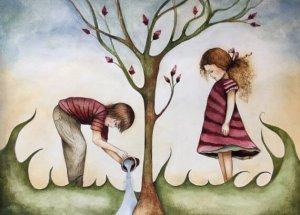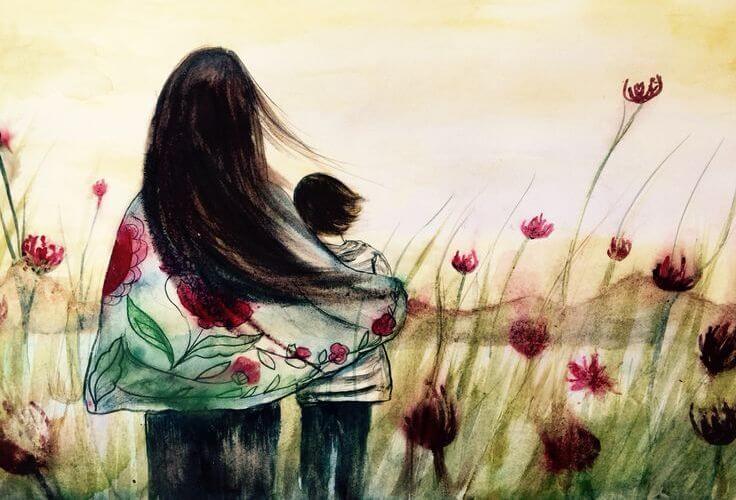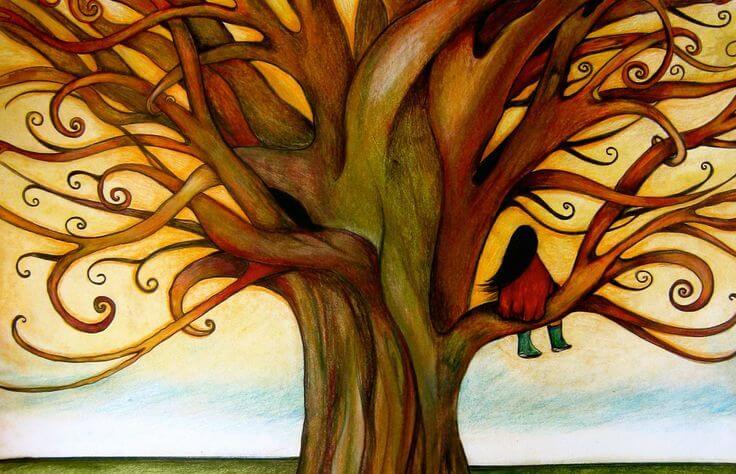Healing the Wounds of an Absent Father


Written and verified by the psychologist Valeria Sabater
We all know how complicated it can be to define the term “family.” Is it defined as only those with whom we share blood? Or those people we have freely chosen and with whom we have built positive and significant bonds?
Talking about family can sometimes reopen certain wounds, let downs, or resentments. And, without a doubt, one of the most complicated figures is that of the “absent father”.
The absent father is not only a physical void of someone who was not present in our lives, but can also refer to cases in which the father, although physically present, either doesn’t know how or doesn’t want to take on his role. It is a psychological absence that creates a diverse set of emotional wounds in a child.
It is very possible that you are familiar with these kinds of situations, either from firsthand experience, or from observing it taking place in the life of a friend.
Sometimes, when we ask someone to tell us about their family, they don’t hesitate to tell us a thousand stories about their mother, grandparents, aunts and uncles, etc… However, when it comes time to talk about their father, their smile becomes strained and they fall silent. They shrug their shoulders and haltingly say…“Well, I don’t know… my dad was… he was just my dad. He was there, nothing more.”
We don’t mean to say that this kind of emotional gap is a characteristic exclusively found in fathers. It can also be found with mothers. However, it is much more frequently found that, when it is time to talk about this kind of harmful experience, it is the father figure who tends to be absent.
The father who is emotionally absent, but physically present

Growing up without a father, a mother, or any kind of role model figure in childhood due to a traumatic event is something that will follow a person throughout their life. This kind of childhood can leave internal and emotional scars that the person must do their best to endure.
However, growing up with a father figure that, despite being physically there, is unable to fully provide affection or recognition, creates a void in the heart of a child who is trying to learn how to build their world.
Some people say that the bulk of the responsibility for how we are raised, how we are cared for, and how we are educated, is the responsibility of the mother. We are not going to deny the importance of her role in forming an healthy bond with her child. That bond will give the child security in each and every one of the steps it takes.
However, the father is also very important. That is an undeniable truth. What happens when at the core of a family there is only an absent father who does not establish any kind of relationship with his children?
A child’s brain is very active. In their day to day life, they need more than anything positive reinforcement to be able to grow in a healthy and mature way.
An absent father creates inconsistencies, gaps, and difficulty in treatment. A child will wait and hope for affection, communication, and daily interaction which will open them to the world through their father. However, when the father is absent emotionally, the child is faced with a wall.
Empty and distant treatment generates anxiety in children. They don’t know how to adjust. They develop expectations that are never fulfilled. When they are older and become more aware, they tend to compare other children’s parents with their own. They notice that the fathers of their friends act differently than their father.
What consequences are there in adult life from the absence of a father figure?
The lack of a father figure generates emotional detachment. It makes a person more insecure when the time comes to establish certain relationships.
The child may grow to be an untrusting adult. The idea of projecting high emotional hopes on someone creates fear. They fear being betrayed, nor recognized, or worse, ignored and neglected.
By the time a child grows up, it is quite likely that they are able to be aware of many more things. They recognize the effort their mother made to make up for the shortcomings of their father, and how, more than once, their mother excused the actions of their father with phrases like…“You know how your father is”, “Don’t do things like that, you already know your father doesn’t like that”, “You just don’t understand…”
As we mature, our eyes are opened to the world, and we learn how to read between the lines. Giants become dwarves, because now we know their secrets. However, a part of us continues to be vulnerable to the past.
How to overcome the wounds of an absent father
Once a person has grown up and has made their own life, they wear their impregnable armor with pride. They know very well what they will do each and every day to not make the same mistakes their father made.

However, the impact of their absent father remains. It doesn’t matter if, in the present, they have a relationship with him, or if he passed away, or if they act like the past never happened when they family all gets together.
The first thing that needs to be done is “understand.” It must be understood that the absent father is a man who did not know how to take on his role as a father because he never understood very well his role as a person in general.
It is very possible that he did not have well developed personal abilities, like strong self-esteem, internal balance, acceptance of his mistakes, fears, and own personal shortcomings.
So, does that justify what he did to his child, and the emotional vacancy he left behind? Certainly not, but understanding can sometimes help us to adjust to reality, and to avoid withholding more negative emotions.
As an adult, the child knows they have grown and matured with many gaps due to that kind of upbringing and lack of affection. However, there always comes a moment in which they should cut ties with the suffering of their past in order to heal their present wounds.
Without a father, it is most likely that the person had a more meaningful and healthy bond of attachment with their mother, grandparents, or even friends. They are who stand as their pillars of strength day in and day out.
They are the authentic family, those who are truly important. A father does not just give life. A father is the person who is there for their child, who picks them up, who tends to them, and who guides them safely through each day, building a path of significant moments in the life of their child.
Images courtesy of Claudia Tremblay
We all know how complicated it can be to define the term “family.” Is it defined as only those with whom we share blood? Or those people we have freely chosen and with whom we have built positive and significant bonds?
Talking about family can sometimes reopen certain wounds, let downs, or resentments. And, without a doubt, one of the most complicated figures is that of the “absent father”.
The absent father is not only a physical void of someone who was not present in our lives, but can also refer to cases in which the father, although physically present, either doesn’t know how or doesn’t want to take on his role. It is a psychological absence that creates a diverse set of emotional wounds in a child.
It is very possible that you are familiar with these kinds of situations, either from firsthand experience, or from observing it taking place in the life of a friend.
Sometimes, when we ask someone to tell us about their family, they don’t hesitate to tell us a thousand stories about their mother, grandparents, aunts and uncles, etc… However, when it comes time to talk about their father, their smile becomes strained and they fall silent. They shrug their shoulders and haltingly say…“Well, I don’t know… my dad was… he was just my dad. He was there, nothing more.”
We don’t mean to say that this kind of emotional gap is a characteristic exclusively found in fathers. It can also be found with mothers. However, it is much more frequently found that, when it is time to talk about this kind of harmful experience, it is the father figure who tends to be absent.
The father who is emotionally absent, but physically present

Growing up without a father, a mother, or any kind of role model figure in childhood due to a traumatic event is something that will follow a person throughout their life. This kind of childhood can leave internal and emotional scars that the person must do their best to endure.
However, growing up with a father figure that, despite being physically there, is unable to fully provide affection or recognition, creates a void in the heart of a child who is trying to learn how to build their world.
Some people say that the bulk of the responsibility for how we are raised, how we are cared for, and how we are educated, is the responsibility of the mother. We are not going to deny the importance of her role in forming an healthy bond with her child. That bond will give the child security in each and every one of the steps it takes.
However, the father is also very important. That is an undeniable truth. What happens when at the core of a family there is only an absent father who does not establish any kind of relationship with his children?
A child’s brain is very active. In their day to day life, they need more than anything positive reinforcement to be able to grow in a healthy and mature way.
An absent father creates inconsistencies, gaps, and difficulty in treatment. A child will wait and hope for affection, communication, and daily interaction which will open them to the world through their father. However, when the father is absent emotionally, the child is faced with a wall.
Empty and distant treatment generates anxiety in children. They don’t know how to adjust. They develop expectations that are never fulfilled. When they are older and become more aware, they tend to compare other children’s parents with their own. They notice that the fathers of their friends act differently than their father.
What consequences are there in adult life from the absence of a father figure?
The lack of a father figure generates emotional detachment. It makes a person more insecure when the time comes to establish certain relationships.
The child may grow to be an untrusting adult. The idea of projecting high emotional hopes on someone creates fear. They fear being betrayed, nor recognized, or worse, ignored and neglected.
By the time a child grows up, it is quite likely that they are able to be aware of many more things. They recognize the effort their mother made to make up for the shortcomings of their father, and how, more than once, their mother excused the actions of their father with phrases like…“You know how your father is”, “Don’t do things like that, you already know your father doesn’t like that”, “You just don’t understand…”
As we mature, our eyes are opened to the world, and we learn how to read between the lines. Giants become dwarves, because now we know their secrets. However, a part of us continues to be vulnerable to the past.
How to overcome the wounds of an absent father
Once a person has grown up and has made their own life, they wear their impregnable armor with pride. They know very well what they will do each and every day to not make the same mistakes their father made.

However, the impact of their absent father remains. It doesn’t matter if, in the present, they have a relationship with him, or if he passed away, or if they act like the past never happened when they family all gets together.
The first thing that needs to be done is “understand.” It must be understood that the absent father is a man who did not know how to take on his role as a father because he never understood very well his role as a person in general.
It is very possible that he did not have well developed personal abilities, like strong self-esteem, internal balance, acceptance of his mistakes, fears, and own personal shortcomings.
So, does that justify what he did to his child, and the emotional vacancy he left behind? Certainly not, but understanding can sometimes help us to adjust to reality, and to avoid withholding more negative emotions.
As an adult, the child knows they have grown and matured with many gaps due to that kind of upbringing and lack of affection. However, there always comes a moment in which they should cut ties with the suffering of their past in order to heal their present wounds.
Without a father, it is most likely that the person had a more meaningful and healthy bond of attachment with their mother, grandparents, or even friends. They are who stand as their pillars of strength day in and day out.
They are the authentic family, those who are truly important. A father does not just give life. A father is the person who is there for their child, who picks them up, who tends to them, and who guides them safely through each day, building a path of significant moments in the life of their child.
Images courtesy of Claudia Tremblay
This text is provided for informational purposes only and does not replace consultation with a professional. If in doubt, consult your specialist.








